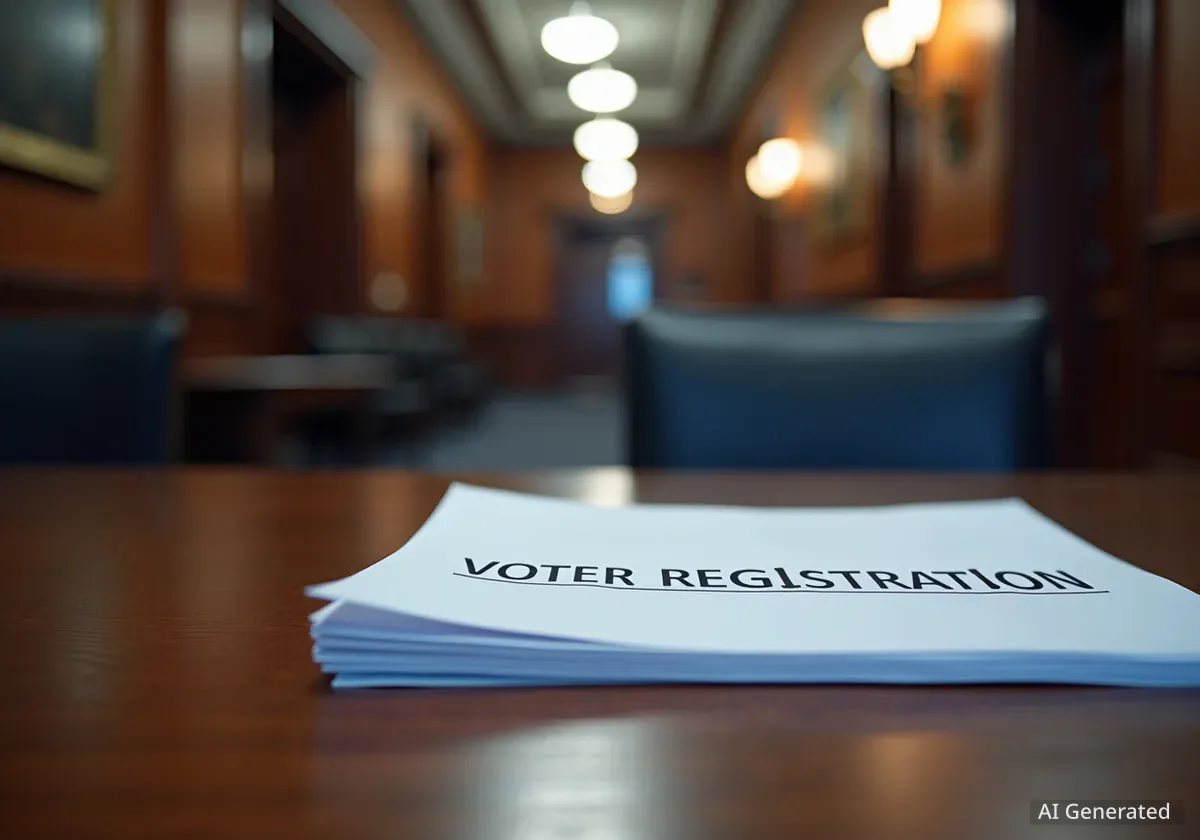During the Trump administration, the U.S. Department of Justice (DOJ) initiated legal actions and sent formal notices to multiple states regarding the maintenance of their voter registration lists. These actions were based on allegations that states were not complying with federal law requiring them to remove ineligible voters from their rolls in a timely manner.
The legal challenges centered on the National Voter Registration Act of 1993, which mandates that states make a reasonable effort to maintain accurate voter lists. While the administration framed these efforts as necessary for election integrity, they drew criticism from voting rights advocates who argued the actions could lead to the improper removal of eligible voters.
Key Takeaways
- The Trump administration's Department of Justice took legal action against several states concerning their voter list maintenance procedures.
- The primary legal basis for these actions was the National Voter Registration Act of 1993 (NVRA).
- The DOJ alleged that states failed to remove deceased individuals or those who had moved out of state from their voter rolls.
- These enforcement actions were met with criticism from voting rights groups, who raised concerns about potential voter suppression.
Legal Framework The National Voter Registration Act
The foundation for the Justice Department's actions was the National Voter Registration Act of 1993, commonly known as the NVRA or "Motor Voter Act." This federal law was designed to increase voter registration opportunities across the country. However, it also includes provisions requiring states to maintain accurate and current voter registration lists.
Section 8 of the NVRA specifically mandates that states implement a program to remove the names of ineligible voters from the official lists. This includes individuals who have passed away or who have moved to a different jurisdiction. The law sets out specific procedures and safeguards states must follow to avoid wrongfully removing eligible voters.
The NVRA's Dual Mandate
The National Voter Registration Act has two main goals that can sometimes be in tension. First, it aims to make it easier for citizens to register to vote. Second, it requires states to keep their voter rolls clean to ensure election integrity. The Trump administration's focus on the list maintenance part of the law brought this tension to the forefront.
The process of removing voters, often called "voter roll purges," is a sensitive issue. While necessary for accuracy, if not conducted carefully, it can result in the disenfranchisement of eligible citizens. The DOJ's increased enforcement under the Trump administration highlighted the ongoing debate over how to balance list accuracy with voter access.
States Targeted by the Justice Department
Throughout the Trump administration, the DOJ's Civil Rights Division sent letters of inquiry and, in some cases, filed lawsuits against various states. These actions were often preceded by letters from conservative watchdog groups that had conducted their own analyses of state voter data.
Notable Cases and Inquiries
Several states faced scrutiny from the Justice Department. For instance, in 2018, the DOJ sued the state of Kentucky, alleging that it had more registered voters than adult citizens. This lawsuit was later settled, with Kentucky agreeing to enhance its list maintenance procedures.
California also received a letter from the DOJ questioning its compliance with the NVRA. The department raised concerns about the state's processes for removing ineligible voters. Similar inquiries and threats of legal action were directed at other states, creating a pattern of federal oversight focused on voter roll accuracy.
"Under the NVRA, states are required to make a reasonable effort to remove the names of ineligible voters from the official lists of eligible voters by reason of... death or a change in residence," the DOJ stated in its communications with various states, citing the specific federal statute.
In another significant action, the DOJ sued Pennsylvania in October 2020, just before the presidential election. The lawsuit alleged that the state had failed to remove the names of deceased individuals from its voter rolls. However, a federal judge dismissed the case shortly after it was filed.
Arguments For and Against the Enforcement Actions
The debate over the Trump administration's voter roll actions involved two fundamentally different perspectives on election administration. Supporters and critics presented strong arguments based on their interpretation of election law and its purpose.
The Push for Election Integrity
The Trump administration and its allies argued that these legal actions were essential for maintaining the integrity of U.S. elections. They contended that bloated and inaccurate voter rolls could create opportunities for fraud and undermine public confidence in the electoral process.
Focus on Data Discrepancies
Many of the DOJ's inquiries were triggered by data suggesting that some counties had registration rates exceeding 100% of their eligible voting-age population. While such figures can sometimes be explained by lags in data updates, they were often cited as evidence of poor list maintenance.
Proponents of the enforcement actions claimed they were simply holding states accountable to existing federal law. They pointed to the clear language of the NVRA, which requires states to conduct regular list maintenance. From this viewpoint, the DOJ was fulfilling its duty to enforce the law as written.
Concerns Over Voter Suppression
On the other side, voting rights organizations and many state officials voiced strong opposition. They argued that the administration's aggressive approach was politically motivated and designed to make it harder for certain populations to vote. They often referred to these actions as attempts at voter suppression.
Critics pointed out that large-scale purges of voter rolls, even when intended to be accurate, often result in the removal of eligible voters. This can happen due to clerical errors, reliance on outdated data, or confusion between individuals with similar names. These voters might not realize they have been removed until they show up to vote on Election Day.
- Risk of Error: Matching voter files with other databases (like change-of-address records) is not always perfect and can lead to mistakes.
- Disproportionate Impact: Opponents argued that purges often disproportionately affect minority, low-income, and young voters, who tend to move more frequently.
- Timing of Lawsuits: Some actions, like the lawsuit against Pennsylvania, were initiated very close to a major election, raising questions about their timing and intent.
The Broader Context of Election Debates
The Trump administration's focus on voter roll maintenance did not occur in a vacuum. It was part of a broader national conversation about election security, voter fraud, and access to the ballot box. These issues became central to the political discourse during this period.
The administration's actions were consistent with a larger effort to tighten election rules, which also included pushes for stricter voter ID laws and limitations on mail-in voting. These efforts were often justified by claims of widespread voter fraud, though evidence of such fraud remains extremely rare.
The legal challenges over voter rolls have continued beyond the Trump administration, with private organizations and political parties frequently engaging in litigation over how states manage their registration lists. The core tension between ensuring accurate rolls and protecting the rights of every eligible voter remains a central challenge in American election administration.





